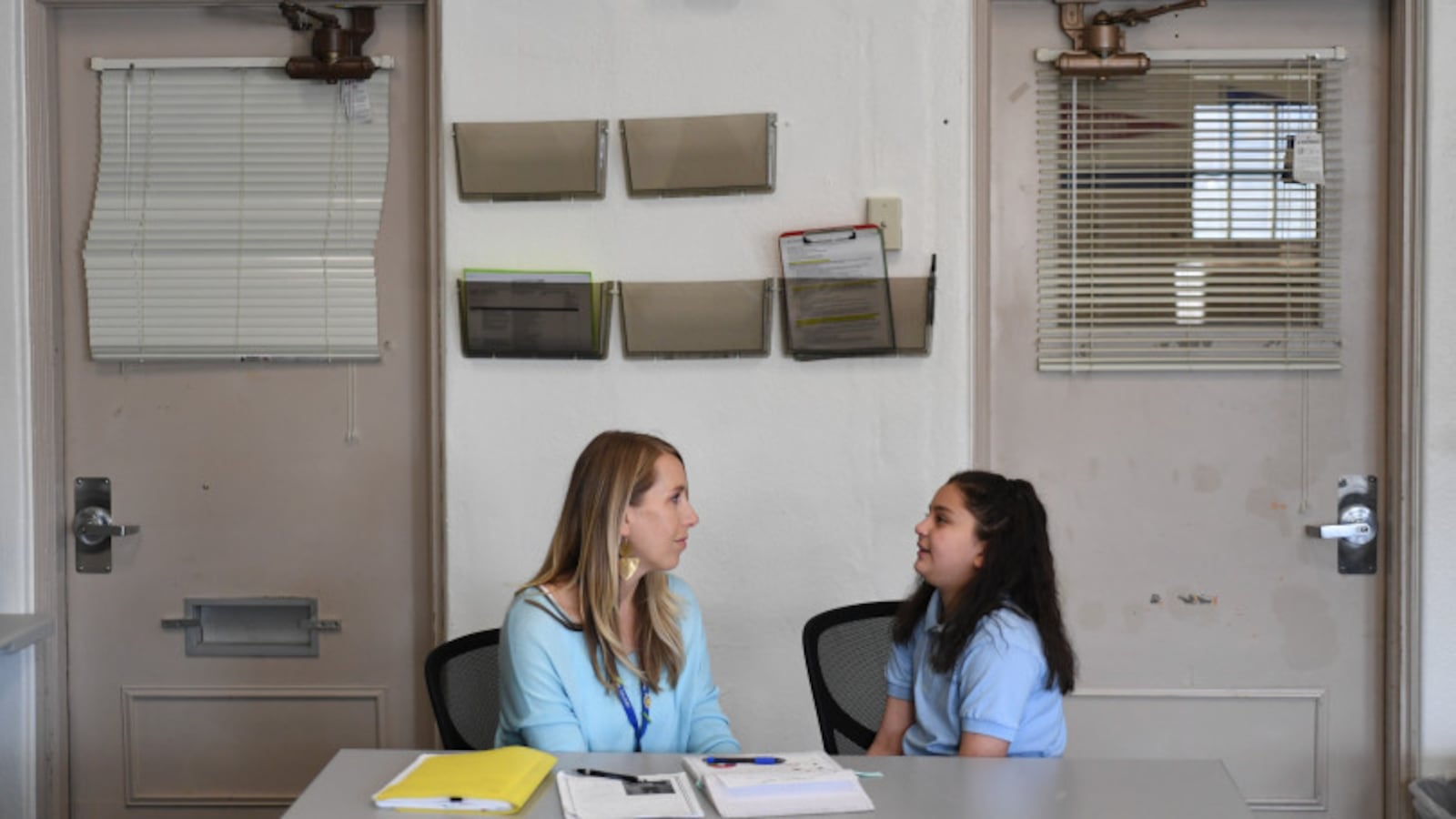Against a backdrop of rising youth suicide rates and disproportionately harsh discipline for black and Latino students, Denver teenagers and parents are calling for more mental health workers — and fewer police officers and security guards — in the city’s schools.
Over the past few months, the Denver Public Schools superintendent and school board heard from a 16-year-old high school junior who said he has attempted to take his own life 11 times. His school, he said, “had no resources to help me.”
Eighteen-year-old senior Marlene Infante Sanchez recounted how despite her good grades and behavior, her high school labeled her a “bad kid” when her attendance dipped because she was dealing with issues at home. Instead of finding a way to support her, she said school administrators threatened to transfer her to another school.
Through tears, graduate Alizae Martinez recalled the day her mother told her they were losing their housing. Unable to focus in class, she said she went to the school counselor, who suggested coloring or meditating, and then sent her back to class.
“I left feeling the same and worse, stupid for thinking she would help or even care,” Martinez said. “Just because my grades were fine and I was not failing does not mean I was OK.”
The dearth of mental health professionals in schools is a national issue that’s fast gaining attention. A recent report by the American Civil Liberties Union found that millions of public school students in the United States attend schools where there are police but no counselor, psychologist, social worker, or nurse. And even schools that do have mental health workers are drastically understaffed compared with recommended ratios.
That’s true in Colorado and in Denver Public Schools, despite the district investing millions of additional dollars in recent years to hire more school-based mental health staff. Last year, the ratio of students to social workers in Denver was 681-to-1, according to data from the Colorado Department of Education. The recommended ratio is 250-to-1.
Students, graduates, and parents with the advocacy organization Padres & Jóvenes Unidos presented a list of demands Thursday night to Denver Superintendent Susana Cordova and school board President Anne Rowe. Among them: Lower the ratio of students to mental health workers, disarm campus safety officers, and put an end to police officers in schools.
In addition to unarmed campus safety officers, the Denver district had 35 armed safety officers last year and 16 “school resource officers,” who are city police assigned to schools.
The group wanted Cordova and Rowe to answer yes or no to each of its demands. But the superintendent and board president said they weren’t prepared to do that on the spot. Both committed to working with the community to come up with solutions to these issues.
“I want to continue the collaboration, the hard work, and the pushing, as opposed to checking off boxes this evening, because we need to work together,” Rowe said, referring to a poster-sized list of the demands that had a checkbox next to each.
Cordova, a Denver Public Schools graduate who began her career as a teacher in the district and whose children attended Denver schools, thanked the group for their advocacy.
“I, as a parent, have had my own children experience institutional racism,” said Cordova, who is Latina. “I understand and I believe in your stories. And we need to do a much better job.”
Cordova became superintendent in January. Her publicly released goals for her first months include reaffirming the use in all Denver schools of “restorative practices,” which is a way of responding to student misbehavior that emphasizes repairing the harm done rather than doling out punishment. While some Denver schools serve as national exemplars for restorative practices, others lag, an inconsistency Cordova acknowledged.
Cordova’s plan also calls for requiring district staff to undergo training to address the biases that contribute to racial disparities in student discipline. While district statistics show the numbers of suspensions and expulsions in Denver have fallen more than 60 percent each since 2007, black and Latino students are still far more likely to be suspended than are white students.
Parent Lorena Limón recounted Thursday how her son was threatened with suspension in preschool for saying “bad words.” Another boy, who was white, was not, she said. The district now has a policy to limit suspensions of students in preschool through third grade, a change sparked in part by the advocacy of groups such as Padres & Jóvenes Unidos.
“We are here because our black and brown students need us to be here,” said Mónica Acosta, a Denver Public Schools graduate who is the group’s organizing director. “This is a human and civil rights violation and we are here tonight to say, ‘Not on our watch.’”
Another organization, Students for Education Reform, has also been pushing to increase mental health support. Its demands include that the district hire at least one mental health counselor in every school. Those counselors should reflect the students they serve, the group says, and focus solely on student mental health needs instead of splitting their time between special education obligations, academic counseling, and other things.
“You don’t want to talk about harming yourself to the same person that’s going to write your recommendation for college,” said Amelia Federico, a 17-year-old high school junior.
In a district with a billion-dollar budget and leaders who say they value mental health, the students said it’s a matter of those leaders “putting their money where their mindset is.”
“We just don’t put the money in the right places,” said sophomore Valerie Boutwell, 15.

